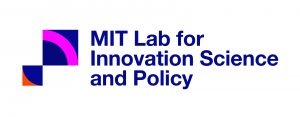Hosted by: MIT Lab for Innovation Science and Policy
Lab Lunch is a seminar series that intersects the study of innovation with its practice as part of the MIT Innovation Initiative’s Lab for Innovation Science and Policy. Bringing together researchers and students, each seminar examines the innovation process from the perspective of different fields with the goal of catalyzing a discussion about how best to study and understand it in that context.
The next seminar, on May 12, will look at the methods and research applications in the study of “twinning” with a particular focus on people in healthcare, clusters and cities, and countries.
Speakers include:
- Dr. Thomas McCoy Director of Research, Massachusetts General Hospital, Center for Quantitative Health (twinning people in healthcare)
- Mercedes Delgado Senior Lecturer, MIT Sloan, Research Director and Research Scientist, MIT Lab for Innovation Science and Policy (twinning clusters and cities)
- Frank Neffke Senior Researcher, Center for International Development at Harvard University (twinning countries)
Details
Friday, May 12, 2017
12:00–1:30 pm
MIT Innovation Initiative/Lab for Innovation Science and Policy
One Broadway, 12th Floor (E70)
Cambridge, MA 02142
Lunch will be served. Please bring an ID and check-in at the security desk in the main lobby upon arrival.
Questions? Contact innovation@mit.edu
Speaker Abstracts & Bios
Thomas McCoy, Massachusetts General Hospital
Matching: from Who to What and When
Abstract: Medicine is filled with questions that will never be answered experimentally because the experiment is unrealistic, unfundable, or unethical; however, the artifacts of routine care captured by electronic health records offer new approaches to these old problems. Matching of cases of interest to controls who hopefully represent the counterfactual trajectory is a popular and increasingly tractable approach. This talk will (1) briefly review prior successes conjuring results that might have been obtained through randomized trial, (2) look at the assumptions about parameterization and timing inherent in the randomized trial outlook, and (3) revisit these assumptions as a means of better addressing the goals of precision medicine.
Bio: Dr. McCoy is the Director of Research at the Massachusetts General Hospital Center for Quantitative Health. His work focuses on building computable phenotypes from the electronic health record. His current subject areas of interest are multidimensional neuropsychiatric phenotypes and biologically informed models of medication effects for repositioning and adverse event prediction.
Mercedes Delgado, MIT Sloan School of Management
The Convergent or Divergent Fortunes of Twinned Clusters and Cities: The Case of Biopharmaceuticals
Abstract: This project will develop an algorithm to identify “twinned” clusters and cities and compare their trajectories over time in the United States. The algorithm will measure the similarities among regional clusters – geographical concentrations of related industries and firms – in an initial year to identify clusters that are twins (or part of larger multiples). We refer to the set of very similar clusters as “twinned.” The goal is to use the twinning algorithm to assess whether and why similar clusters converge or diverge in performance over time. For example, consider a pair of twinned biopharmaceutical clusters in two different regions (e.g., Boston and Washington D.C.) in an initial year (e.g., 1998). Do their performance trajectories become different, and why? One particular mechanism that we will examine is the inter-regional connectivity induced by firms that participate in multiple locations (e.g., Pfizer is present in biopharmaceutical clusters in Boston, Philadelphia, and New York City, among other locations). Prior work shows that agglomeration benefits arise within regional clusters, but regional clusters can also benefit from linkages with clusters in other locations. We propose a novel measure of inter-cluster connectivity across regions based on the degree of “firm overlap” (i.e. the percentage of shared firms between any pair of regional clusters). The goal is to assess the extent and type of inter-cluster linkages and examine their role in the performance trajectory of clusters and their regions.
Bio: Mercedes Delgado is a Senior Lecturer at MIT Sloan, and the Research Director and Research Scientist of the MIT Lab for Innovation Science and Policy. Delgado’s research focuses on the relationship between the regional business environment and the performance of firms, regions, and countries. She examines the role of regional clusters — geographic concentrations of related industries, firms, and supporting institutions — in job creation, innovation, entrepreneurship, and resilience.
Frank Neffke, Harvard Kennedy School
Catalysts of Regional Innovation: How Foreign Firms Allow New Regions Join The Global Innovation Contest
Abstract: Invention is highly concentrated in a few places in the world. Moreover, the spatial distribution of invention – as measured by patenting activity – changes relatively little over time with few locations joining the ranks of the major players that push the world’s technological frontier. However, technological process still opens up new windows of opportunity for new innovation centers to emerge. In case studies of successful examples thereof, foreign firms often play an important role in the diffusion of technologies to these new centers. This paper sets out to assess whether there is quantitative evidence for the conjecture that firms in established technological centers are a main driver in the emergence of new nodes in the global innovation network. We focus on regions in which local investors start filing patents on behalf of foreign firms. Performing panel matching at the region×technology-class level to construct suitable counterfactual development paths, we estimate the role of foreign firms in the global diffusion of technological prowess by means of difference-in-differences estimations. These estimates show that such firms indeed can help regions develop innovative capacities. However, we find that there are important differences among different types of firms in the extent to which they set in motion local innovation processes. These differences are not just reflected in a region’s inventive activities, but also in measures of interaction between the foreign firm and the local economy.
Bio: Frank Neffke is a Senior Researcher at the Center for International Development at Harvard University. His research focuses on the role of skills in diversification and structural transformation. Frank has written on the emergence of new regional growth paths, the role of worker and firm mobility in the diffusion of industries and technologies and on the importance of skill complementarities among coworkers. Before joining CID, Frank worked as an assistant professor at the Erasmus School of Economics in Rotterdam, The Netherlands. He holds a Ph. D. in Economic Geography from Utrecht University and Master degrees in Econometrics and Philosophy from the University of Amsterdam.


